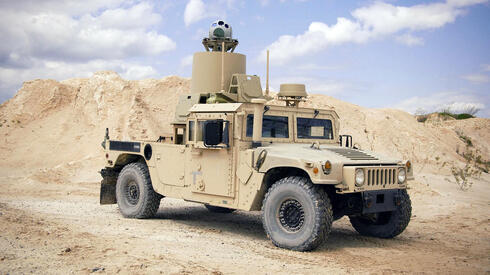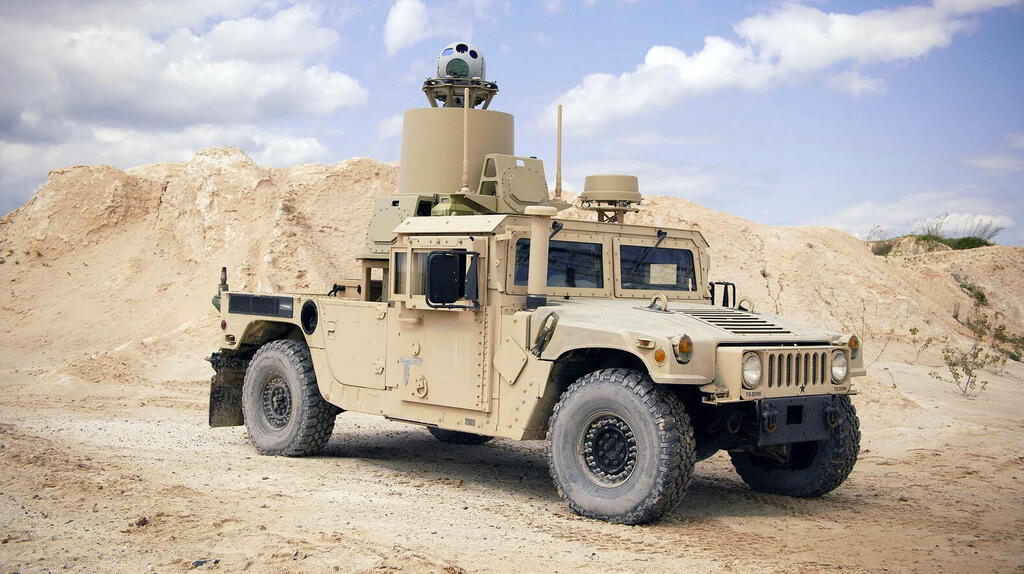
Anti-drone systems were sent to war despite previously malfunctioning in US
Systems that the Israeli company D-Fend sold to the USA through Elta suffered malfunctions, and 15 of them were returned to D-Fend. During the war, similar systems were loaned to the Ministry of Defense, although the CEO of D-Fend admitted: "There is a real risk that the malfunctions will return and repeat themselves." D-Fend: "The quality of the systems is not in doubt."
Anti-drone systems previously sold by the Israeli defense company D-Fend to the U.S. Department of Defense (DOD), and marketed by Elta North America (ENA), suffered from various malfunctions, 15 of which were returned to D-Fend, and at least two of which, used by The Combating Terrorism Technical Support Office (CTTSO), were completely disabled (a total loss).
This is evident, among other things, from a letter whose contents reached Calcalist, and was sent at the end of October from D-Fend's chairman and CEO, Zohar Halachmi, to Elta, a subsidiary of the government-owned Israel Aerospace Industries (IAI). In the letter, in which Halachmi states that his employees are working to repair EnforceAir-type systems so that they can be loaned to the Ministry of Defense in Israel "for the purpose of the war effort", he adds that "there is a real risk that the malfunctions will return and repeat themselves". The EnforceAir system for neutralizing drones, manufactured by D-Fend and marketed by ENA in the USA, is intended for military and security use to protect against drones, and is installed on vehicles.
According to the companies, this is an independent system that identifies and locates hostile drones, takes control of them and lands them in a predefined safe area. The system is meant to operate without disruption of cellular communication waves, internet, radio and GPS. The cost of each system unit is estimated at about $250,000-300,000.
D-Fend was founded in 2017 by Zohar Halachmi, Yaniv Benbenisti and Assaf Monsa. It developed systems for neutralizing drones in state security scenarios, a field that has received great interest from military and security bodies in recent years. In September 2019, D-Fend raised $28 million in a B round, which was led by Claridge Israel, with the participation of Vertex Israel. According to research firm IVC, D-Fend has raised a total of $32 million to date. According to the Registrar of Companies, it employs 170 people.
Among the small investors in D-Fend, according to the Registrar of Companies, is Eric Banoun, who served as Vice President of Sales and Business Development of NICE's cyber and intelligence division. As previously revealed in Calcalist, Banoun was one of the marketers of NSO's Pegasus offensive cyber system to a foreign country whose name has been banned from publication by the court. Banoun was also one of the shareholders of the Israeli cyber company Senpai, which Calcalist previously revealed provided a surveillance system used to track political activists in Malaysia on the eve of the tumultuous elections in the country in 2018.
In April 2019, D-Fend and ENA, a subsidiary of IAI that markets defense products in North America, signed an agreement with the US government under which they undertook to provide EnforceAir systems to entities under the U.S. Department of Defense (DOD), including the FBI, the U.S. Army and the U.S. Border Patrol, in addition to the CTTSO.
A short time later, as part of the cooperation of the two Israeli companies with the U.S., ENA committed to purchase 80 EnforceAir systems from D-Fend in exchange for $20 million.
According to information received by Calcalist, since the sale of the systems to the U.S. and until today, there have been various complaints and claims about malfunctions in the system, which was developed, among other things, according to the needs of the American Department of Defense. These led to a bitter conflict between D-Fend and ENA over the responsibility for the malfunctions and the costs of the repairs. In light of the disputes, as part of a settlement from 2021, and after D-Fend filed a lawsuit in the U.S. ro receive an amount of over $5 million from ENA, it was agreed on the return of 15 of the systems from ENA to D-Fend.
However, the story did not end there. Additional complaints about malfunctions in the systems were received, which are currently used by the CTTSO. In an email from July 2022 sent by the representative of the American special forces Jason Boutin, the Program Lead and Systems Integrator, to the special forces personnel as well as to the representatives of D-Fend, he asked to elaborate on the "concerns that we (5th special forces group) have with regards to the EnforceAir SDR."
SDR (Software-defined radio) is a component of the system, in which problems were discovered, according to the email, during training in Texas. In the correspondence, Boutin went into detail about various faults discovered in EnforceAir and even attached pictures.
The malfunctions and repairs in the systems led to a conflict between the manufacturer of the D-Fend anti-drone systems and the marketer ENA. In October 2023, according to the letter sent by Halachmi, Chairman and CEO of D-Fend, to Gadi Iloz, Head of Purchasing and Logistics Administration at Elta Systems, the conflict escalated.
"D-Fend employees have been working day and night for the past two weeks in order to repair and prepare the EnforceAir system belonging to Elta, according to the settlement agreement, for the Ministry of Defense," wrote Halachmi, who demanded $1.3 million from Elta, after noting that "the debt is directly related to the systems loaned to the Ministry of Defense for the purpose of the war effort."
The letter revealed that Halachmi decided to deduct approximately $600,000 from funds that the company is supposed to pay to Elta for "rework work that D-Fend performed on the EnforceAir systems that arrived at D-Fend", as well as for "handling faults that were discovered in two systems owned by the American government". Halachmi added that "the malfunctions were not dealt with on the ENA side, and this despite repeated requests from D-Fend, and there is a real risk that the malfunctions will return and repeat themselves."
D-Fend stated: "These are unfounded and baseless claims originating from a purely commercial dispute, which D-Fend will prove in court via a written defense and/or in a lawsuit. D-Fend is the world's leading company in its field, with hundreds of successful installations, worth tens of millions of dollars annually in revenue. The company's customers, including security agencies and governments around the world, and the world's largest airports, express full satisfaction and consistently increase usage of the systems. Customers have had unparalleled success with the quality of D-Fend's systems, which have repeatedly been proven to be effective. And Elta itself continues selling our systems to its clients, including this month, when Elta asked for a quote that would enable it to sell another D-Fend EnforceAir system to its customers.
"There is no relation between the commercial dispute described in this article and systems in the possession of security forces in Israel or any other country. The systems mentioned refer to systems provided by Elta North America to its customers in the USA, as mentioned in the article. The malfunction in these individual systems was caused by a component developed by Elta North America, or those working on its behalf, for an integration performed by Elta between the D-Fend systems and other Elta systems."
IAI stated in response: "IAI is a leading business company that constantly works to maintain the security of the state while cooperating closely with our allies around the world. The company is careful and will continue to be careful about the quality of its products, and that is why we are appealing to the judicial system. The facts and details will be discussed and clarified, as is customary in court.”
No response was received from the Ministry of Defense.
















